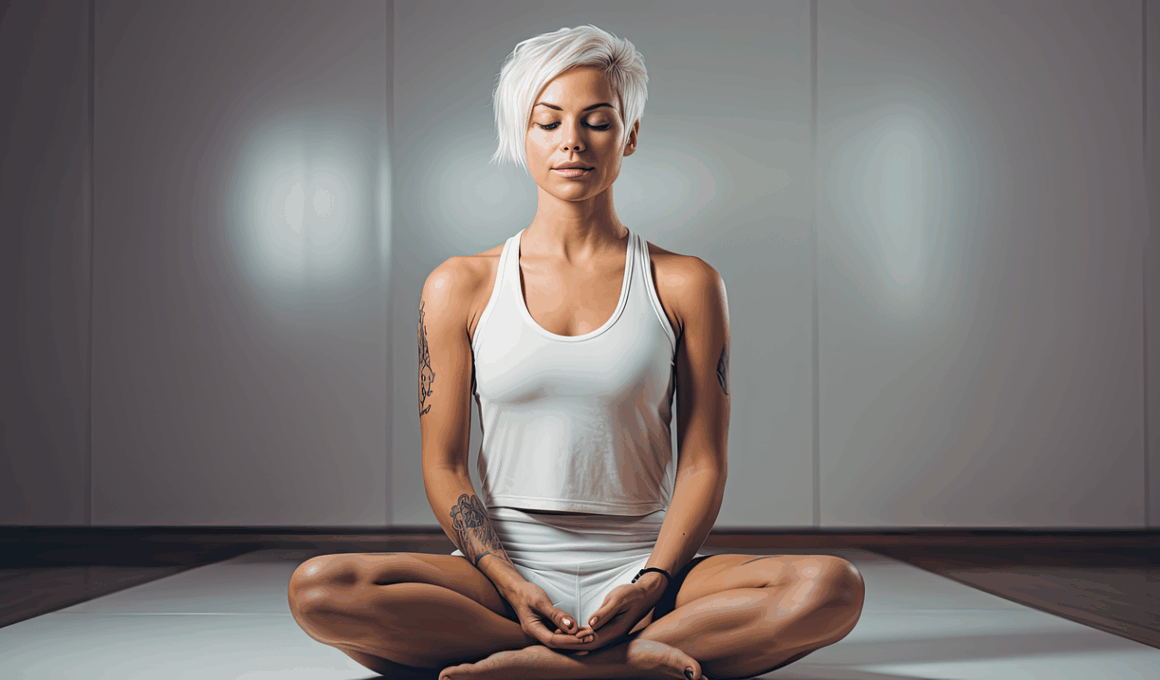Pilates for Stress Relief: Home Workouts to Relax Your Mind
Pilates offers a unique approach to stress relief through targeted exercises that enhance physical strength and mental clarity. Developing a regular home workout routine can be particularly beneficial in addressing everyday stressors. The beauty of Pilates lies in its focus on controlled movements and breath work, which can lead to a serene mental state. Incorporating basic Pilates exercises into your home routine is simple and extremely effective. Engaging in even short sessions can calm your mind, reduce anxiety, and foster relaxation. Moreover, establishing a routine allows you to make a reliable escape from everyday pressures, creating a sanctuary within your home. Embrace the tranquil space around you as you exercise and nurture your mental well-being. It is important to listen to your body and modify exercises as necessary, and using props like a mat or a resistance band will enhance your workouts. You’ll find that it’s a personal journey—one that can adapt and grow with your needs and preferences.
Incorporating specific Pilates exercises aimed at stress relief can significantly enhance your home workout experience. Try starting with the “Roll Up,” which stretches your spine and promotes relaxation. This exercise not only helps with flexibility but also encourages deep breathing, calming the mind. Transitioning into the “Child’s Pose” is another gentle way to alleviate tension in the back and shoulders. The key is to focus on your breath while executing these movements, bringing awareness to how your body feels. Create a calming environment by dimming the lights and playing soothing music to complement your routine. Take the time to connect your mind and body through these mindful movements. When you engage fully in your practice, you’ll discover that each exercise can become a form of meditation, transporting you away from stressors and towards peace. Consistency is key; aim for at least three sessions a week. Combining strength, stretching, and breath control, Pilates fosters not just physical well-being, but also enhances mental clarity and emotional balance.
Mindfulness in Pilates
Mindfulness plays an essential role in Pilates, allowing practitioners to focus deeply on their body movements and breath. By centering your awareness on each exercise, you diminish distractions, paving the way for mental relaxation. Engaging in mindfulness extends beyond just completing routines; it’s about connecting deeply with each movement. Being present while you practice helps in reducing anxiety levels and creating a more peaceful state of mind. Start by allocating a specific time during the day to dedicate solely to your Pilates practice, free from interruptions. As you stretch and strengthen your muscles methodically, maintain your focus solely on your body and breathing. Combine the physical aspect with a sense of exploration. Recognize any emotions that surface, and let go of any distractions that hinder your well-being. Mindfulness in Pilates brilliantly complements the physical exercises, creating a profound experience conducive to stress relief. This practice can help you develop patience and self-awareness, vital tools for managing daily life demands in a more balanced manner.
Employing specific breathing techniques during Pilates workouts can greatly enhance your relaxation. The “Pilates Breath” technique emphasizes inhaling deeply through your nose while expanding the ribcage, followed by a slow, controlled exhalation through your mouth. This method, when practiced during each movement, facilitates an unfurling of tension held within the body. Be sure to pair your breathing with fluid movements to maximize both mental and physical benefits. For instance, try coordinating your breath with exercises like the “Saw” to heighten focus and effectiveness. As you exhale, visualize releasing stress and tension from your body. Furthermore, consider integrating visualization strategies while you practice; imagining serene landscapes or peaceful scenarios can create a more calming environment. Ultimately, synchronizing breath with movement in Pilates can foster relaxation while toning and strengthening your body. Over time, these synchronized patterns will become more natural, making every session increasingly therapeutic. Pilates breathing, combined with mindful movements, presents an engaging way to combat stress, benefiting both body and mind in life’s hectic moments.
Setting Up Your Pilates Space
Creating an inviting space for your home workouts can greatly enhance your Pilates experience and stress relief. Choose a quiet, comfortable area in your home conducive to relaxation. Clear any clutter to minimize distractions and help maintain a calm atmosphere. Utilize natural light if possible or incorporate soft, adjustable lighting options. The ambiance you create directly influences your state of mind during your practice, enhancing your focus and allowing deeper engagement with movements. Consider using essential oils such as lavender or eucalyptus to promote a sense of calm and tranquility as you work out. Investing in a quality exercise mat is also beneficial, providing the right amount of cushioning while ensuring stability. Adding soft music or nature sounds can further enhance the atmosphere, creating a sanctuary for your mind and body. Each Pilates session becomes an intentional retreat from stressors, encouraging relaxation as you wind down. Remember, the physical environment should support your practice while also nurturing your emotional and mental well-being through intentional setup and purposeful preparation.
Staying consistent with your Pilates workouts is crucial for achieving necessary stress relief and mental clarity. Establishing a schedule that works for you creates a routine, making it easier to integrate workouts into your week. Consider pairing Pilates sessions with other stress-relieving practices, such as meditation or yoga, for a holistic approach to mental wellness. Developing a strong connection between mind and body facilitates a smoother transition into a serene mindset. Emphasize quality over quantity; focusing on the intention behind each movement will yield better results than rushing through repetitions. Track your progress to see how your strength and flexibility improve; this can be motivating and reaffirming. Set realistic goals, whether small or large, to maintain enthusiasm and excitement. Use each practice session as a chance to explore different exercises or experiment with variations. Through discovery, enhance both the mental and physical aspects of Pilates, boosting your experience. Stay patient with yourself, and remember that every effort contributes to your overall journey of finding balance and tranquility in life.
Incorporating Pilates into Your Daily Routine
Integrating Pilates into your daily routine can lead to significant improvements in stress management and overall well-being. Try beginning with a short morning session, setting a positive tone for the day ahead. You can also choose to engage in Pilates during lunch breaks to rejuvenate your mind and body, alleviating any accumulated tension. Being intentional about your practice helps reinforce the habit, making it a regular part of your lifestyle. Opt for 10-15 minute routines if you’re short on time; consistency is more important than duration. Evening sessions serve as a fabulous way to unwind, drawing your focus away from daily stresses while preparing you for restful sleep. Consider incorporating online classes or video tutorials for guidance, expanding your repertoire of exercises and techniques. Engaging with community resources, such as local Pilates groups, can introduce motivational support. Such connections bolster your commitment to practicing regularly and deepen your understanding of Pilates. By actively incorporating these sessions, you establish a powerful self-care practice aimed at nurturing your mental clarity and emotional balance.
Engaging in Pilates not only supports physical wellness, but it also enhances emotional and mental health significantly. By committing to this practice, you develop valuable tools for managing stress effectively. Make sure to celebrate your achievements, no matter how small, as they accumulate success over time. By connecting with yourself holistically through Pilates, the journey of discovering self-care can be transformative. Ultimately, prioritizing mental well-being through physical activity nurtures personal growth and resilience against stressors. Through each mindful movement, embrace the incredible potential of Pilates to uplift your spirits, encouraging a deeper connection to your body and mind. Explore your boundaries, honor your body, and enjoy the process; you deserve a haven of relaxation amidst life’s challenges. Celebrate your growth, and remember that every practice is a vital step towards creating a balanced, fulfilling life. By establishing these dedicated moments for self-care, you open doors to a calming lifestyle, enriching your overall quality of life. The fusion of Pilates and mental wellness is an ongoing discovery of peace, strength, and relaxation. Embrace these exercises and reap the rewards of serenity in your life.


